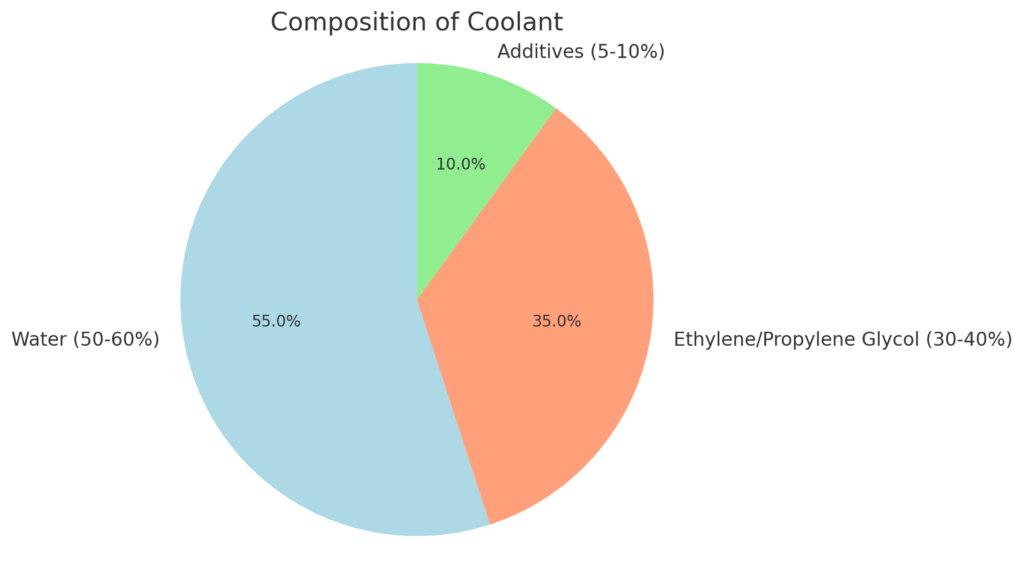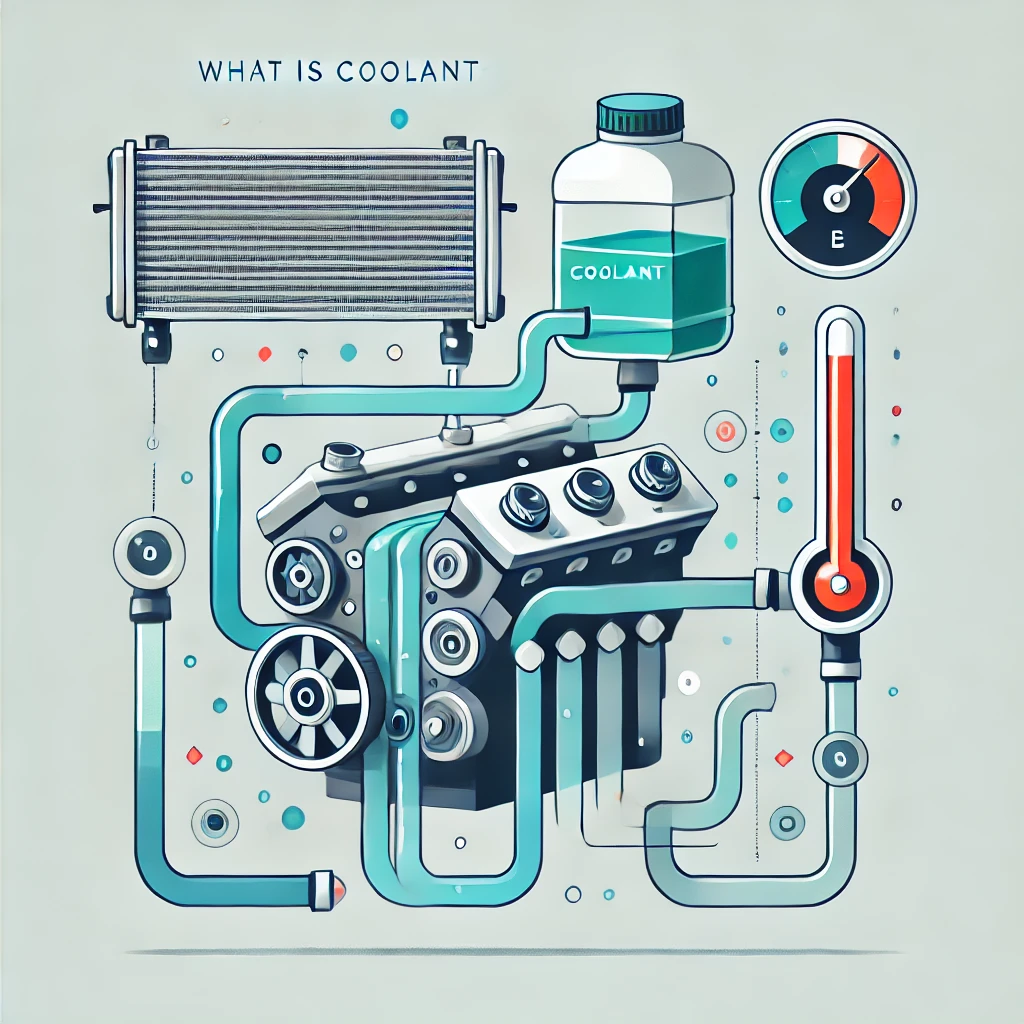In the intricate world of automotive engineering, maintaining optimal engine performance and longevity is paramount. One of the unsung heroes in this endeavor is coolant—a vital fluid that plays a crucial role in regulating engine temperature. But what is coolant, how does it work, and why is it essential for your vehicle?
This comprehensive guide delves into the fundamentals of engine coolants, their types, benefits, maintenance tips, and common issues, providing you with a thorough understanding of this essential automotive component.
What is Coolant?
Coolant is a liquid mixture composed primarily of water and antifreeze agents, designed to absorb and dissipate heat from the engine. It flows through the engine block, absorbing heat generated by combustion and transferring it to the radiator, where it is released into the atmosphere. This continuous cycle prevents the engine from reaching temperatures that could cause damage or reduce efficiency.
Key functions of coolant include:
- Maintains optimal engine temperature by absorbing excess heat.
- Contains additives that protect engine components from rust and corrosion.
- Prevents the coolant from freezing in cold climates, ensuring uninterrupted engine performance.
- Raises the boiling point of the coolant mixture to prevent overheating in high-temperature environments.
Composition of Coolant

The primary components of coolant include:
- Water (50-60%): Offers superior heat transfer capabilities, ensuring efficient cooling.
- Ethylene Glycol or Propylene Glycol (30-40%): Lowers the freezing point and raises the boiling point, enabling coolant to function in extreme temperatures.
- Additives (5-10%): Protect engine components from corrosion, scale buildup, and foam formation.
Types of Coolant
There are several types of coolant available, each formulated to meet specific engine requirements and environmental conditions. The primary types include:
Ethylene Glycol-Based Coolant
Ethylene Glycol (EG) is the most common antifreeze agent used in coolant formulations. It offers excellent thermal properties, making it highly effective in heat transfer and temperature regulation.
- Pros:
- Superior heat transfer capabilities.
- Effective in a wide range of temperatures.
- Cons:
- Toxic if ingested, posing environmental and safety risks.
- More susceptible to corrosion without proper additives.
Propylene Glycol-Based Coolant

Propylene Glycol (PG) is a less toxic alternative to ethylene glycol, often used in applications where environmental or health concerns are paramount.
- Pros:
- Lower toxicity compared to ethylene glycol.
- Safe for use around animals and humans.
- Cons:
- Slightly lower heat transfer efficiency than ethylene glycol.
- May require different additive formulations to ensure protection.
Hybrid Organic Acid Technology (HOAT) Coolant
HOAT coolants combine organic acid technology with other additive technologies to provide enhanced protection against corrosion and scaling.
- Pros:
- Long-lasting protection against corrosion.
- Compatible with a wide range of engine materials.
- Cons:
- Typically more expensive than conventional coolants.
- May require specific formulations for certain vehicle makes and models.
Organic Acid Technology (OAT) Coolant
OAT coolants rely solely on organic acids for corrosion inhibition, offering extended service life without the need for frequent changes.
- Pros:
- Extended service intervals, often up to 5 years or 150,000 miles.
- Minimal impact on engine components.
- Cons:
- Not always compatible with older engines or certain materials.
- May require specific formulations based on vehicle requirements.
How Coolant Works
The coolant system in a vehicle operates as a closed loop, continuously circulating the coolant mixture to manage engine temperature. Here’s a step-by-step overview of how coolant functions:
- As the engine runs, combustion generates heat. The coolant absorbs this heat as it flows through the engine block.
- The heated coolant travels to the radiator, where heat is transferred to the surrounding air through the radiator fins.
- The cooled coolant returns to the engine to absorb more heat, maintaining a consistent temperature.
- A thermostat regulates the flow of coolant based on engine temperature, ensuring optimal cooling efficiency.
- A water pump drives the coolant through the system, maintaining continuous circulation.
This process ensures that the engine operates within its optimal temperature range, preventing overheating and maintaining performance.
Coolant vs. Antifreeze
While the terms coolant and antifreeze are often used interchangeably, they refer to slightly different aspects of the engine’s cooling system:
Key Differences
| Aspect | Coolant | Antifreeze |
|---|---|---|
| Definition | The entire fluid mixture used in the cooling system. | The component within coolant that prevents freezing and boiling. |
| Components | Water, antifreeze agents, and additives. | Primarily ethylene glycol or propylene glycol. |
| Function | Regulates engine temperature, prevents corrosion, and ensures optimal performance. | Lowers freezing point and raises boiling point of the coolant mixture. |
Signs of Coolant Problems
Identifying coolant issues early can prevent severe engine damage and costly repairs. Here are common signs that indicate potential coolant problems:
| Symptom | Possible Cause | Recommended Action |
|---|---|---|
| Overheating Engine | Low coolant level, coolant leak, faulty thermostat, water pump failure | Check coolant level, inspect for leaks, consult mechanic |
| White Smoke from Exhaust | Coolant entering combustion chamber, blown head gasket | Have the engine inspected immediately |
| Sweet Smell in Cabin | Coolant leak in the heating system | Locate and repair the leak |
| Discolored or Milky Oil | Coolant mixing with engine oil (possible head gasket issue) | Seek professional diagnosis and repair |
| Low Coolant Level | Leaks in the radiator, hoses, or water pump | Inspect and fix leaks, refill coolant |
| Coolant Warning Light | Low coolant level, sensor malfunction | Check coolant level and system integrity |
| Bubbles in Radiator or Overflow Tank | Air trapped in the cooling system, coolant boiling | Bleed the cooling system to remove air |
| Rust or Sludge in Radiator | Corrosion or sediment buildup | Flush and replace coolant, inspect for damage |
Common Myths About Coolant
Misconceptions about coolant can lead to improper maintenance and potential engine issues. Here are some common myths debunked:
1. Water Alone is Sufficient for Engine Cooling
Reality: While water is an excellent coolant in terms of heat transfer, it lacks the necessary antifreeze properties to prevent freezing and boiling. Additionally, water alone does not contain corrosion inhibitors, leading to potential rust and damage to engine components.
2. All Coolants are the Same
Reality: There are various types of coolants formulated for different engine requirements and environmental conditions. Using the wrong type can lead to corrosion, scaling, and reduced cooling efficiency.
3. Coolant Only Prevents Freezing
Reality: Coolant serves multiple purposes, including preventing freezing, raising the boiling point, protecting against corrosion, and ensuring efficient heat transfer.
4. Changing Coolant is Optional
Reality: Regular coolant maintenance is essential for engine health. Neglecting coolant changes can lead to corrosion, overheating, and costly engine repairs.
5. Mixing Different Coolant Types is Fine
Reality: Mixing different types of coolants can lead to chemical reactions that reduce their effectiveness, cause sludge formation, and increase the risk of corrosion.
Conclusion
Coolant is an indispensable component of your vehicle’s engine system, ensuring optimal performance, preventing overheating, and protecting against corrosion. Understanding the different types of coolant, their composition, and proper maintenance practices is essential for any vehicle owner aiming to extend the lifespan and reliability of their engine.
By debunking common myths and staying informed about the latest advancements in coolant technology, you can make informed decisions that contribute to the efficiency and longevity of your vehicle.
